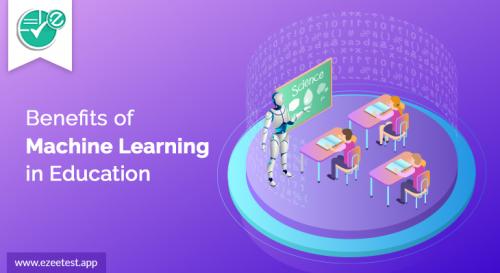The Influence of Machine Learning in Education

Blended learning may become more common in modern classrooms as teachers are shifting to machine learning.
Both the students and teachers are enjoying the modernized versions of lessons. And, it seems reasonable to rely on advances in education with machine learning, provided we balance the expectations with a human touch.
Let us understand the influence of Machine Learning in Education with a human touch.
The education sector today is evolving continuously with the introduction of the Internet-based learning environment. Many of the educational institutes are adopting new learning environments such as the virtual classroom, distant laboratories, and, so forth.
Machine learning in education is believed to provide novel solutions to the prevailing and anticipated problems in education. The machine learning techniques may become the solutions to the problems like predicting the learning success in technical and vocational education, practical and advanced learning methods, use of social media for the educational purpose, and, etc.
Though the applications are broad and in nascent stages, a few of the applications of machine learning in education have been mentioned below.
Applications of Machine Learning in Education
- Analysis of individual grade and finding a personalized way of learning to the student
- Optimization of the academic lessons as per the student’s knowledge retention
- Understand students strengths and weaknesses in group projects or team balance
- Review the learnings with the help of spaced repetition algorithms
- Prioritize the learning process based on students’ interests and trends
- Processing of articles/essays using Natural language processor
- Generate quiz questions on the topics interested to students
- Track the learning skills and progress using Analytics
- Help the student with the additional and easy learning
Use Cases of Machine Learning in Education:
Machine learning has been adopted in a few tools that would help to develop the skills and testing systems already. As it drives the efficiency, personalization, and streamlines the tasks related to administration, it gives an ample time and opportunity to teachers for understanding the adaptability of the students’ and in what more ways they could be helped in their academics.
A few of the use cases of machine learning include:
Personalized learning coach:
The bots provide the learner with supporting and adaptive learning by analyzing the learner’s acquired and speed of knowledge.
Moderator:
The bots could be used as a moderator when a large learning community is involved by answering the questions, onboarding the learners, or alert the human moderators.
Certifier:
The bots can assess the performance-based behavior by training through the data footprints and grade automatically for a large dataset of students are present.
Creator:
The bot helps to generate a human-friendly text from a vast data. It simplifies the learning process and efforts of the student and helps to understand with ease.
Curator:
The bot can suggest additional learning videos, texts, and other related reading materials contextually to the students’ ability and interest.
Also, several use cases are being explored for the advantages of teachers and students’ learning.
You May Also Be Interested In Benefits of Artificial Intelligence in Education
Advantages of Machine Learning in Education:
As the students would be working with machine learning algorithms, deep learning, bots, natural learning processors, and more in their near future, it is suggested that they get introduced the system in their early years of studies.
Some of the advantages of machine learning in education are as mentioned below.
Individual and differentiated learning:
Our Indian education system always wanted a customized learning for the students. The companies like Carnegie learning are busy in developing intelligent instructional design and software platforms to facilitate the students with differentiated and individual learning. It also makes the teacher’s job easy who handles a minimum of 40 students in a classroom.
Global Classrooms:
The students gain an opportunity to attend global classrooms with required translators. It facilitates the particular category of students who want more than they get from the regular classroom and looks for learnings at a different level. It also helps the specially challenged like visually or hearing impaired students in a personalized manner.
Automated Administrative Tasks:
Machine learning is beneficial for teachers too. The teachers get an ample time as the grading and data entry systems could be automated and made faster. The time could be utilized for the students’ and provide recommendations to close the learning gaps. They get more time to attend to the students individually as compared to the traditional learnings.
Let’s move on further.
Machine Learning and Future of Education:
At this juncture, what could be the future of education?
As a final note, we should remember that Machine learning must be used as a tool to deliver the best learning experience. The instruction modeling approach could be considered as the remedy gaps in student knowledge.
And, a successful implementation of machine learning in education always require the active role of teachers. When harnessed efficiently, it may revolutionize the education field in better ways.
Post Your Ad Here
Comments